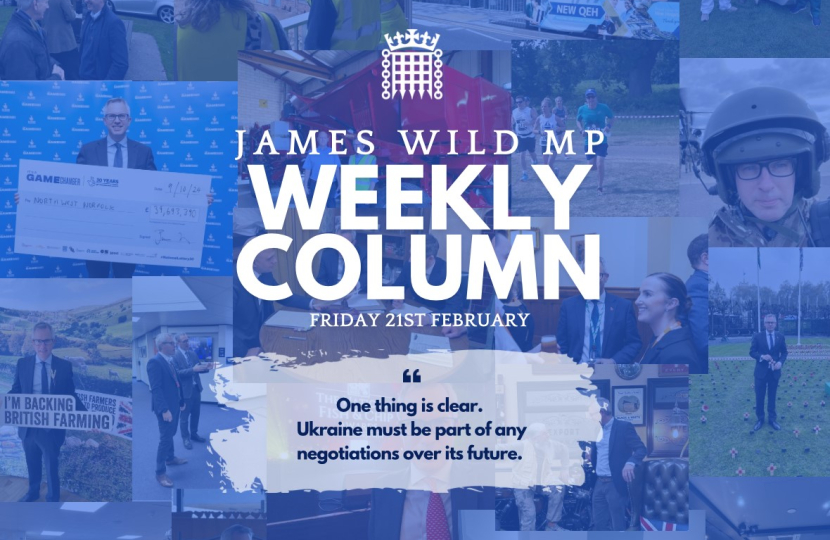
One of the most powerful memories from my time as MP for North West Norfolk, is standing in King’s Staithe Square marking Ukrainian Independence Day. Many of the families who came to Norfolk under the Homes for Ukraine Scheme after Putin's illegal invasion were there.
Now there is huge international focus on this issue following President Trump’s election and statements by his Administration this week.
One thing is clear. Ukraine must be part of any negotiations over its future.
During an urgent question in the House of Commons a few days ago, I called on the government to ensure that any future negotiations on Ukraine’s security are meaningful and put its sovereignty at the heart of decision making. I warned against repeating past mistakes, which failed to achieve long term peace.
My view is that given Putin’s illegal invasion and declared intent, the government should agree that any negotiations must result in a sovereign Ukraine and the UK playing its part in providing security guarantees that are meaningful as that is crucial to security a lasting peace.
In response, the defence minister said security guarantees are likely to be an important part of any peace agreement. We have a 100 year partnership with Ukraine and are committed to ensuring that they can defend their sovereign capability to continue to exist. She said whilst it’s too early to talk about any details of what those security guarantees might be, we are very committed to making sure that Ukraine continues as an independent state.
So what needs to happen now? First, European countries need to heed the United States’ calls to take responsibility for our own continent’s security.
This is not a new call. President Clinton’s defence Secretary made that argument over twenty years ago. And when I advised the then Defence Secretary a decade ago, we tried to secure a commitment from NATO allies to spend 2 per cent of GDP on defence. Many responded but not all. Now it is not an ask, it is a necessity.
As the US Administration sets out its position clear thinking is needed. It is also important to recognise that G7 leaders – including the US - agreed a statement that supports a permanent peace deal which would offer robust security guarantees to Ukraine and respects their freedom, sovereignty, independence, and territorial integrity.
So that is a positive starting point. But let’s not lose focus on why we supported Ukraine’s self-defence originally. If we let Russian aggression go unchecked then worse will happen. Talk to our allies bordering Russia and their nervousness is real.
Linked to this is the threat of tariffs. I pointed out in the House of Commons that it is no secret President Trump loves tariffs and intends to use them. My sense is that ministers are a little complacent in their approach. Yet the government seems to have had limited discussions with the Administration about continuing tariff-free quotas for British steel since the inauguration.
Of course, part of this is that the Government’s failure to commit to spend 2.5% of GDP on defence makes it harder to defend UK interests.
So the Prime Minister needs to commit to a firm date by which defence spending will hit 2.5 per cent. And how that will improve the lethality of our Armed Forces. Nothing less will do.

